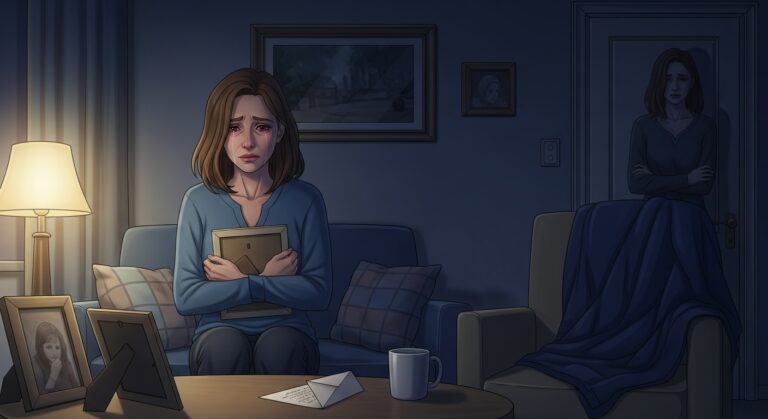Teen’s Evil Stepmom Wrecks Her Life With Endless Rules, Oblivious Dad Just Allows It To Happen
Lily could feel it in the air: every rule, every command, every demand was another chain around her wrists. She was sixteen, slim, with caramel-skin that glowed under the hallway light, dark curls that fell just past her shoulders, and eyes sharp, haunted, burning with a quiet anger. Her stepmom, Marissa, was almost thirty-five, fair-skinned with a rigid posture, always precise: straight hair, clean nails, always dressed in pressed blouses, smelling faintly like lemon and perfume. Her dad, James, mid-forties, gentle face, graying at the temples, warm brown eyes that were soft and kind, always believed Marissa when she said all these rules were for Lily’s good.
It started small. At first, Lily didn’t mind. New household, new expectations—they seemed bearable. But as weeks became months, rules piled up. No phone after 8pm. Always home by 6pm. “No friends over unless I know them.” No music that “disturbs the peace.” Marissa banned Lily’s art supplies from the living room, made her clean her room every day, even made her take off makeup that Marissa deemed “too loud.” Every minor choice became a battlefield.
Lily tried talking to her dad. “Dad,” she said one night, voice trembling, “why can’t I stay out until 9 just once?” But James, on the couch with Marissa beside him, shook his head. “Marissa keeps saying you’re not responsible. She wants you safe,” he said. Lily felt his voice but not his understanding. She felt alone.
At school, Lily held up a mask. She smiled when asked about the weekend. But inside she counted rules. Ate what stepmom cooked even if she hated it. Went to bed when told even when her mind was wide awake. She saw her friends have freedom—staying late, having parties, playing music loud. She wanted that. But most nights, she lay awake listening to the soft hum of the house, wondering if she was wrong to want more.
Homework became more than just study. Marissa checked everything: whether Lily’s backpack was tidy, whether she had her planner, whether her uniform was clean, whether her shoes were polished. Lily’s grades dropped—not for lack of effort but because the pressure distracted her. Once she forgot to polish her shoes, Marissa exploded. Lily was grounded from speaking to her friends the whole weekend. Lily sat in her room, tears burning, but no one asked if she was okay.
One Friday, her best friend, Jenna, asked her to come over. Jenna said they’d watch a movie, order pizza. Lily tried to ask. Marissa refused. “You have chores. I expect your room clean before you leave tomorrow morning.” Lily argued. “It’s just one evening!” But Marissa stood firm. James didn’t intervene. He said: “Do what Marissa says.” Lily left without going. Jenna didn’t understand. Everyone thought Lily was just quiet sometimes. But really, she was shrinking.
It grew worse when Marissa forbade Lily to paint in her sketchbook during dinner or late at night. She said creativity was fine, but only at designated times—in daylight, in the living room, with the TV off, lights on. That killed Lily’s passion. She hid brushes, paints. In secret, she stayed up drawing on weekends, stuffing artwork in drawers, hiding it under her bed. Her designs grew dark, jagged. Faces with eyes that looked like tears. Scenes where rules bent, broke. Sometimes she woke up at night, heart pounding from dreams of Marissa shouting.
Dad began to notice changes. Lily no longer laughed at family dinners. She stayed in her room after school. She flinched when Marissa asked, “Why didn’t you clean the kitchen?” But for years, he believed rules = order = good. He believed Marissa saw dangers he couldn’t. He thought strict structure would protect Lily in life. He didn’t see how structure was suffocating her.
One evening, Lily couldn’t take it anymore. She came down to dinner holding a plate. Marissa criticized how Lily had set the forks. Lily’s hands shook. She dropped the plate. It shattered. The sound filled the room. Lily shrank backwards. Marissa’s eyes widened, then anger. Dad stood up. He looked from the broken plate to Lily’s face. Lily’s eyes wet, shame burning on her cheeks. Dad said, “That’s enough.” But Marissa said Lily was careless. She said Lily needed discipline. Dad said softly, “Let’s all calm down.” Lily said nothing. She pushed past Dad, ran upstairs. Her door slammed. The hollow sound echoed.
That night, Dad knocked lightly. Lily didn’t answer. He tried again. She said, “Go away.” He heard her crying. He wanted to apologize. But Marissa was there too, arms crossed, expression icy. Lily’s father said, “I’m sorry, Lily.” She didn’t come down. He stood alone in the hallway with fragments of plate under his shoes, a broken dinner, broken heart.
Days later, Lily’s teacher called. She’d been missing assignments—all that perfection Marissa demanded took time Lily didn’t have. Lily acted out mildly in class—snapping at classmates, refusing tasks. The teacher told Dad. He listened, nodded. But when Lily came home angry, he told her to apologize and respect rules. Lily felt unseen, unheard.
Then one afternoon, Lily had to go to an art competition. It was her dream. She practiced secretly. But Marissa said no: too many hours. “You have chores. You have to help with laundry. You have to cook with me.” The day arrived, she didn’t go. Lily cried. Dad came into her room and saw her poster, dusty. He touched it. Lily turned away. He said, “I’m sorry you didn’t go.” She whispered, “You could’ve stopped her.” He nodded, voice breaking inside. But Marissa was watching from doorway. She said painting was a hobby, not a priority.
Lily stopped sharing. She stopped asking. She let things happen. She began to believe maybe her life didn’t matter enough to fight for.
One rainy night, Lily sat by the window, watching drops trail on the glass. She saw Dad, distant in the living room, reading a paper. She thought of talking, spilling everything. But the words stuck in her throat. She wondered if he would truly hear her, or just see Marissa’s version. She wondered how much time it would take before she felt like herself again.
She pulled her sketchbook from under her bed and drew—not flowers, but a lone figure in a dark room, beaded light through cracks. A girl reaching through bars that weren’t there. A father’s face beyond the bars, hands outstretched. She pressed the pencil hard, lines jagged. With every stroke, she put a part of her soul into the paper. And for a moment, it felt like breathing.


